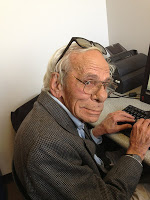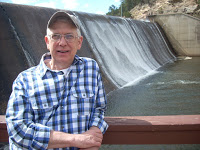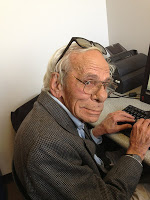Cringing, I wiped cobwebs from my face that day as if I were in a movie navigating the canoe downstream through an African jungle of reeds. Would we be attacked by crocodiles? Would snakes drop out of the trees? Would we be overturned by a hippopotamus? I certainly hoped not and knew boas, crocs, and hippos were in short supply along the Black River that flows through the desert south of Carlsbad, New Mexico.
“The water splits into two channels just ahead,” I shouted back to David. “It looks like more water goes to the left.”
“Then take it to the left.” So I guided the canoe into the passage past rocks and willows. Still no snakes; and then we were beyond the reeds with their spiders. We continued to paddle, not in a hurry, just looking at what lay ahead.
David and I enjoyed each other’s company. We were both ministers who shared leadership in religious education and got a kick out of being together. We were attending a ministers’ retreat at the Tres Rios Area Retreat Center not far from where the Black River emerges from Carlsbad Caverns in southeastern New Mexico. The prior evening the retreat group had made a short canoe trip upstream to where the water appears from beneath a dry, rocky riverbed. At breakfast David asked the retreat director if the river was navigable downstream and found out one could canoe about half a mile, then make a short portage, and then canoe another three quarters of a mile.
“Would you be interested to go down the river with me?” he asked.
“Sure,” I answered, although I am not particularly the outdoorsy type. Still, I liked spending time with this man. We had already been talking about how we hoped someday to find a mastodon tooth or other age-marking relic at this site on the western edge of the old Permian Sea Basin. Perhaps we would make our discovery on this trip.
During an afternoon break we walked to the canoe rack. I suggested we carry the canoe a few yards down the road to a place where I thought we could easily get it into the river and ourselves safely into the boat. David asked, “Why don’t we just put in here. The access looks easy, and the water’s barely moving.”
“But this seems quite a bit higher than where I was thinking,” I countered, my indoors preferences showing a little too clearly. “We’ll probably have to navigate through some riffles or walk in the water.” But we followed David’s suggestion and started our unusual adventure.
As we left the reeds I warned, “The stream separates here again. Looks like more water on the left.”
“Go for it,” David advised. We did. I ducked to avoid an overhanging tree branch, and when I looked ahead screamed, “It’s a waterfall!”
We plunged over the rocky edge dropping about five feet into a deep pool. I held my straw cowboy hat as the canoe went under and turned over. Sputtering, I bobbed to the surface, took a big breath, and grabbed for the canoe. “You okay, David?” I asked my likewise sputtering friend.
“Yeah. Boy that was a surprise.”
“Are you hurt?”
“I don’t think so. I did bump my shin on the canoe. I’ll be fine,” he reassured me. “How about you?”
“I’m fine,” I lied as I found a foothold on a rock. The 50° F water came up to my neck. “I’m standing on the bottom here. If you hang onto the canoe I think the current will push you over to the shore. Then we’ll see if we can get the water out of the boat.”
We were successful and finally got the canoe righted and emptied. In the process I felt my right knee giving way. As the current continued to push against my leg, I tightened the muscles gripping the rock with my feet. What I didn’t tell David was that my knee had dislocated in the fall and was threatened to give out again. I was starting to feel chilled. I suggested David carefully hoist himself into the canoe while I held it secure against the shore. Then he held it while I slithered in like the jungle snake I had feared.
“I hurt my knee,” I admitted when I got safely aboard. “But I want to go on down to the first portage. I want to see the river. We can come back up here to get out.” I pulled off my shirt to wrap my knee and re-secured my lifejacket. The desert sun warmed me as we paddled downstream.
Huge cottonwood trees provided shade over some of the river, and in these bosque giants blue herons nested. I’d never seen such large birds perched in trees. The whole area took on an exotic aura for me. As we drifted, sunfish jumped right next to the canoe. I wondered if anyone fished here. Surely few people had floated the river. As I examined the bank, I was fascinated by the way clusters of prickly pear cacti hung over the precipice like green waterfalls sometimes extending ten feet or more to the water’s edge. I thought of the mounds I’d once seen on the high bank above, ruins of the homes of people who lived in the area long before white or Spanish arrivals or even the Athabaskan Apaches migrations. I wondered at the history and the exotic, profligate beauty of this ancient desert terrain.
When the river got too shallow, we turned back upstream, then dragged the canoe up the steep slope to the road. After we hoisted the canoe back onto the rack, I limped to the dormitory while David fetched ice and an ACE bandage from the kitchen. With my leg elevated, I lay back in an easy chair and told other retreat participants about our misadventure. Finally I closed my eyes playing back scenes from my own point of view richly embroidered by movie cuts from Saturday afternoon matinees of my childhood.
Certainly this was an unusual day of adventure and new experiences, a singular time I will long remember and often retell. The waterfall threatens to grow higher, the river longer, and of course, my torn meniscus more painful.
Denver 2010
About the Author
Phillip Hoyle lives in Denver and spends his time writing, painting, giving massages, and socializing. His massage practice funds his other activities that keep him busy with groups of writers and artists, and folk with pains. Following thirty-two years in church work, he now focuses on creating beauty and ministering to the clients in his practice. He volunteers at The Center leading “Telling Your Story.”
He also blogs at artandmorebyphilhoyle.blogspot.com


